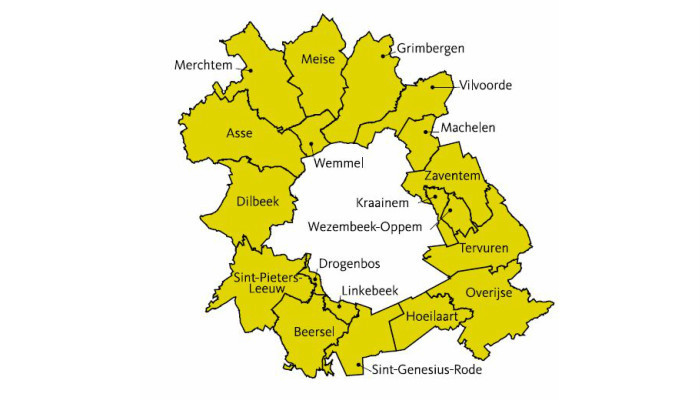10 questions - 7. Why does the Rand stays monolingual?
7. Why do the Flemish people hold so strongly to the monolingualism in the Vlaamse Rand?
The Vlaamse Rand around Brussels is experiencing fast-paced changes. The growing urban pressure in Brussels has prompted large numbers of people to leave the city. Many of the new arrivals are people who have no knowledge of Dutch. As a result, the local inhabitants and authorities are seeing the rural and Flemish character of their municipalities being eroded. The peripheral municipalities are trying to deal with this situation by encouraging non-Dutch speakers to learn the local language and helping young Dutch-speaking inhabitants to find affordable homes.
THE VLAAMSE RAND
Nineteen Flemish municipalities around Brussels belong to the Vlaamse Rand. These include all municipalities bordering the Brussels-Capital Region or one of the municipalities with facilities. The six municipalities with facilities belong to this group of 19.
FRENCHIFICATION / COSMOPOLITISM
The region around Brussels was literally a Flemish periphery for a very long time. Conducted in 1846, the first census shows that 98% of the population was Dutch-speaking. One hundred years later, only 6% of the inhabitants claimed to know only French but the number of people who said that they spoke French the most or exclusively had risen to 14% in terms of averages.
However, the fast-growing trend towards suburbanisation in the Western World also arrived here in the 1960s. The middle class flight from the city of Brussels resulted in the gradual Frenchification of the Rand. In the wake of Brussels' designation as the capital of Europe, expats followed the same path: well-off European civil servants and people working for multinationals, who generally stay in the region on a temporary basis. More recently, there has been a surge in the number of 'ordinary' migrants. The Rand has therefore become an incredibly diverse region, made up of over 100 different nationalities: one in three inhabitants is of non-Belgian origin while the figure is as high as four in ten in the north-eastern part of the Rand. This influx has also led to a huge language shift.
A recent survey (BRIO language barometer) reports about 80 languages. Dutch is apparently not the common language as it is in other parts of Flanders. It is still the language most frequently used in the home environment but a higher number of people know French. 78% of the people interviewed said that their knowledge of French was good to excellent, while 68% of the individuals asked claimed that their familiarity with Dutch was good to excellent. 47% of the interviewees reported a good to excellent knowledge of English. This shows the extent to which Dutch is coming under pressure owing to the ever-growing number of people who can use internationally important languages and to the Rand's geographical location (bordering on Brussels and on Wallonia in the south, regions with different language provisions).
In spite of their language skills, Dutch-speakers would obviously rather not see their own language's status as the most frequently used common language being eroded. Dutch-speaking people are proud of their culture and language, which is the only official language in Flanders (and, consequently, in the Vlaamse Rand). They are keen to experience and share their culture with newcomers, in the language of that culture. This is a perfectly natural attitude, one that is seen elsewhere in the world, where a language is being oppressed in an environment where the domination of the 'major' languages undermines the respect for and use of the indigenous language. Hence it is perfectly understandable that Flemish people should continue to defend unilingualism in Flanders and the Vlaamse Rand. Obviously, while fully respecting the constitutional freedoms.
FLEMISH POLICY
The policy adopted by the municipalities and Flemish authorities is therefore intended to focus more on the social fabric and community building. Promoting a common language, obviously Dutch, forms an integral part of this policy. That is why measures are being taken to protect the Dutch-speaking character of the region. A lot of local politicians in the Vlaamse Rand are anxious to strengthen the Dutch-speaking character of their municipalities, for instance by encouraging the use of Dutch (and often also discouraging the use of other languages in the public forum). The use of Dutch is compulsory in municipal administrations, except for municipalities with language facilities. Similarly, retailers are often urged to speak in the language of the region, encouraging non-Dutch speakers to learn the language. However, there are exceptions for when Flemish municipalities may use other languages, such as in recognised tourist centres.


